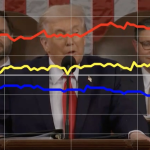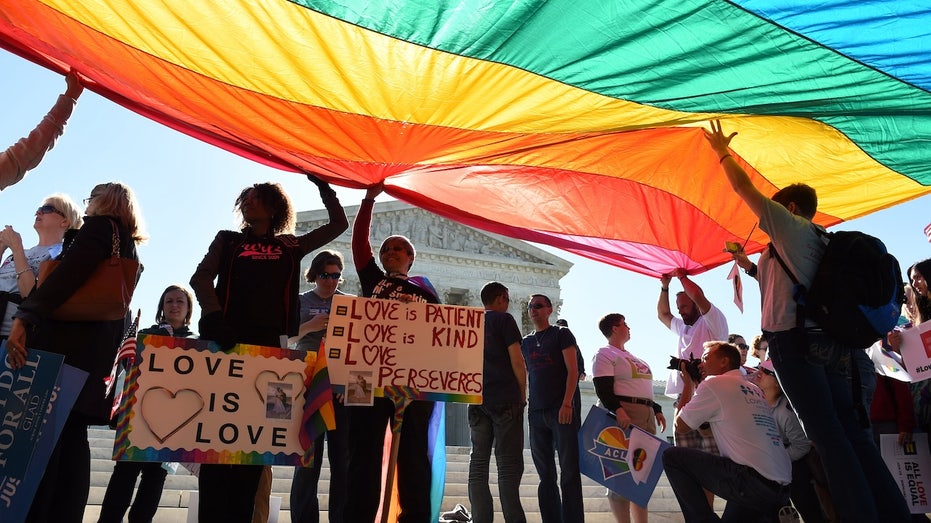The Supreme Court 10 years ago voted to extend the definition of marriage to include same-sex couples, a landmark 5-4 ruling that changed the course of U.S. history — touching off profound changes in public opinion, as well as seismic cultural shifts.
“No longer may this liberty be denied,” Supreme Court Justice Anthony Kennedy wrote for the majority. “The court now holds that same-sex couples may exercise the fundamental right to marry.”
The June 2015 decision in Obergefell v. Hodges ensured same-sex couples were guaranteed the same protections and benefits as their heterosexual peers.
However, the ruling is not without its detractors. In fact, 10 years after the high court’s decision, recent polling shows that public opinion on same-sex marriage is more divided than ever.
GORSUCH, ROBERTS SIDE WITH LEFT-LEANING SUPREME COURT JUSTICES IN IMMIGRATION RULING
The 10-year anniversary of Obergefell also comes at a tense political moment. The White House and Congress are governed, as of January 2025, by a new conservative majority — sidelining progressives and emboldening at least some Republican lawmakers who have signaled interest in challenging the Supreme Court’s landmark decision.
It also comes as the conservative-majority Supreme Court has taken up important cases involving LGBTQ+ eduction, gender-related care and more.
Ten years after the court’s landmark decision, here is a look at where things stand.
The nationwide legalization of same-sex marriage has made such unions more visible, increasing the number of Americans with personal connections to couples directly affected by the Supreme Court’s ruling.
In fact, the number of married, same-sex couples in the U.S. has more than doubled since 2015, according to data from the Williams Institute at UCLA’s College of Law.
In the decade since the Supreme Court’s landmark ruling in Obergefell, public support for same-sex marriage has continued to climb, driven in large part by support from Democrat and Independent voters, though voters across all parties and demographics have seen an uptick, according to data from Gallup surveys over the past 10 years.
Nearly 7 in 10 U.S. voters, or 68% of Americans, said this year that they support same-sex marriage, according to a Gallup poll conducted last month — an 8% increase compared to the 60% majority who said the same in 2015.
Buoyed by popular support, then-President Joe Biden codified same-sex marriage protections at the federal level in 2022 by signing the Respect for Marriage Act, which required the federal government to recognize same-sex and interracial marriages performed in states where they are legal.
SCOTUS RULES ON STATE BAN ON GENDER TRANSITION ‘TREATMENTS’ FOR MINORS IN LANDMARK CASE
While the law stops short of ordering states or territories to marry same-sex couples, it does require them to recognize the marriages as legitimate, so long as they are valid in the state which they were performed.
However, that is not to say these actions have been without detractors.
Support for same-sex marriage has dropped among Republicans in recent years, with the number of registered Republican voters who said they support same-sex marriage dropping from a 55% majority in 2021 to just 41% in 2025, according to data compiled by Gallup.
It is unclear what exactly prompted the shift. However, at least some Republican lawmakers in state legislatures across the country have urged the high court, via symbolic resolutions, to revisit Obergefell and change the nationwide right to same-sex marriage.
In fact, state legislatures in 2024 introduced more than 500 “anti-LBGT” bills, according to the ACLU. Though few of those bills were passed, supporters of same-sex marriage fear that backlash is growing to LGBTQ+ protections — and suggesting it could be an indicator of future opposition — preempting a legal challenge to Obergefell that could, eventually, make its way back to the Supreme Court.
Recent Supreme Court decisions have yielded more speculation as to how a conservative-majority court might rule on same-sex marriage, should they decide to take up any cases challenging Obergefell.
Justices sent shock waves through the nation in 2022 when they overturned Roe v. Wade, eliminating the constitutional right to abortion. The decision also sparked renewed fears that the high court could revisit same-sex marriage protections.
Justice Clarence Thomas, for his part, explicitly suggested the court should do so in his concurring majority opinion in Dobbs v. Jackson, the case that overturned Roe, writing that the court has “a duty to ‘correct the error’ established” in Obergefell and other similar cases.
“In future cases, we should reconsider all of this Court’s substantive due process precedents … [including] Obergefell,” he added.
President Donald Trump has declined, in large part, to weigh in publicly on the matter.
He has, however, taken action to reverse course on Biden-era actions, including signing an executive order on his first day in office declaring that the U.S. will recognize only “two sexes,” male and female, according to a copy of the text.
Experts told Fox News Digital they would not be surprised to see Republican-led challenges to Obergefell, with some pointing in particular the Supreme Court’s decision earlier this month in United States v. Skrmetti — another pivotal case in which justices on the high court voted 6-3 to uphold a Tennessee law banning certain medical care, such as puberty blockers and hormone therapy, to transgender adolescents in the state.
Skrmetti was one of the most closely watched cases of the Supreme Court’s term, and advocates for LGBTQ+ organizations such as the ACLU and Lamda Legal, which argued the case in December, have cited fears that the decision could serve as a legal pretext for future cases involving LGBTQ+ protections — including whether sexual orientation qualifies as a “protected class” on par with race or national origin.
“I wouldn’t be surprised if somebody tried to unwind marriage equality,” Ethan J. Leib, a professor at Fordham Law, told Fox News Digital in an interview following the court’s decision last week.
SUPREME COURT FREEZES ORDER TO RETURN MAN FROM EL SALVADOR PRISON
He noted that the justices who joined John Roberts in the majority opinion — Neil Gorsuch, Brett Kavanaugh, and Amy Coney Barrett — “seemed like they did not want to decide whether trans people are a quasi-suspect classification.”
“My guess is that, if they get another case that’s really about transgender adults,” they might be willing to see the “technical differences” between them — which he said could carve out room for the justices to distinguish themselves from other conservatives on the court.
He also noted Roberts seemingly went to great lengths to determine what counts as a sex classification, which could ultimately make it “much harder” for them to undo Obergefell in the near-term.
At the end of the day, Leib said, “I wouldn’t be surprised if someone tried to unwind marriage equality” and the protections provided under federal law.
“I think I’d be surprised if there were five votes for it,” he said of securing the majority votes to overturn Obergefell. “But you know, but I could, I could see a way of counting to five.”
























